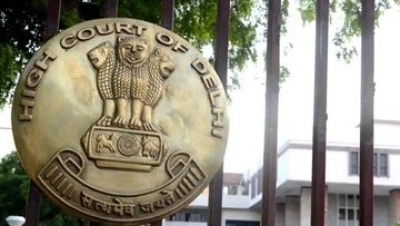New Delhi, Aug 23 : The Delhi High Court on Tuesday observed that as per Mohammedan Law, a Muslim girl who has attained puberty can marry without her parents’ consent and reside with her husband even if she is underage.
Justice Jasmeet Singh made the observation during a recent hearing of a plea filed by a couple–a minor girl and a man– seeking protection and to ensure that nobody separates them.
The court also referred to a verdict of the High Court of Punjab and Haryana at Chandigarh, stating as per Article 195 from the book ‘Principles of Mohammedan Law by Sir Dinshah Fardunji Mulla’, every Mohamedan of sound mind, who has attained puberty, may enter into a contract of marriage.
As per the petitioners, they were in love with each other and married on March 11, 2022, in accordance with Muslim rites and rituals by Maulana Imtiyaz of Jokihat Masjid, District Aauriya, Bihar.
However, the parents of the woman were opposing the marriage and have registered a case under Section 363 IPC (Punishment for kidnapping) against the man.Though initially, the FIR was under Section 363 IPC, subsequently Section 376 IPC (Punishment for sexual assault)and Section 6 POCSO (Protection of Children from Sexual Offences) Act, have been added.She was regularly beaten by her parents at home.The parent tried to forcibly marry her off to someone else despite her love affair, the plea said.
The respondent-state has filed a status report, as per which, the date of birth of the woman is August 2, 2006, i.e.the petitioner was only 15 years and 5 months on the date of the marriage.
On April 27, 2022 petitioner No.1 (woman) was recovered in the custody of petitioner No.2 (man), and her medical examination was conducted at Deen Dayal Upadhyay Hospital (DDU), Delhi.
It was also stated that the couple has had sexual intercourse and as per the directions of the Child Welfare Committee, the child victim has been kept at Nirmal Chhaya Complex, Hari Nagar.
The petitioner’s counsel stated that the woman is pregnant and the couple is expecting a child together.
After the submissions, the court further referred to various judgements and observed that the object of the POCSO Act states that the Act is aimed to secure the tender age of the children and ensure they are not abused and their childhood and youth are protected against exploitation.It is not customary law specific but the aim is to protect children below the age of 18 years from sexual abuse.
In the present case, it is not a case of exploitation but a case where the petitioners were in love, got married according to the Muslim laws, and thereafter, had physical relationships, the court observed.
It is also clear from the status report that the parties were living with each other as husband and wife.There is no averment that they had sexual intercourse prior to their marriage, it held.
“Hence, the petitioners being lawfully wedded to each other cannot be denied the company of each other which is the essence of the marriage.If the petitioners are separated, it will only cause more trauma to the petitioner no.1 and her unborn child.The aim of the state here is to protect the best interest of Petitioner no.1.If the petitioner has wilfully consented to the marriage and is happy, the state is no one to enter private space of the petitioner and separate the couple.The doing of the same will tantamount to encroachment of personal space by the state,” said the court while allowing them to stay together and directing the authorities to ensure their personal safety and protection.
jw/shb/
#puberty #Delhi #Uma #Hari #Nirmal #Chandigarh #Delhi #New Delhi #Haryana #Chandigarh #Punjab
.






